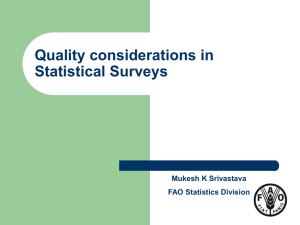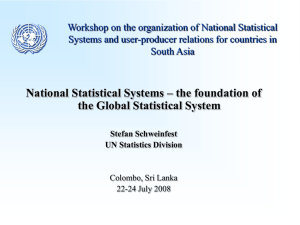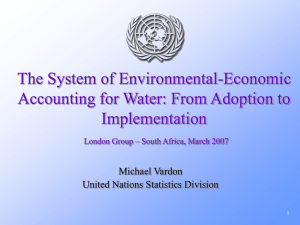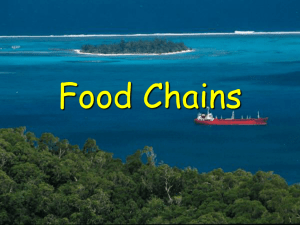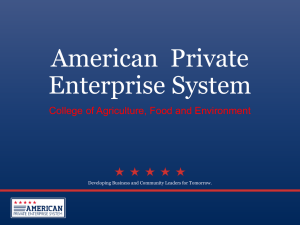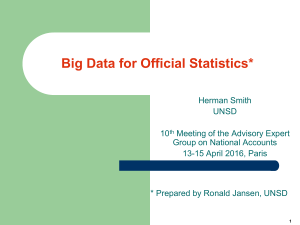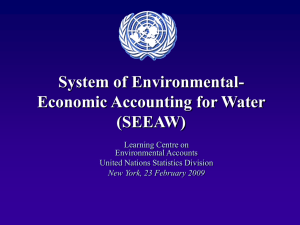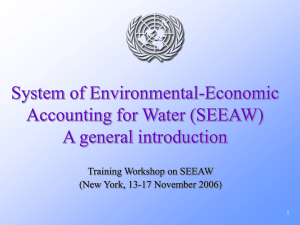Developing an information strategy for water accounts and statistics
advertisement
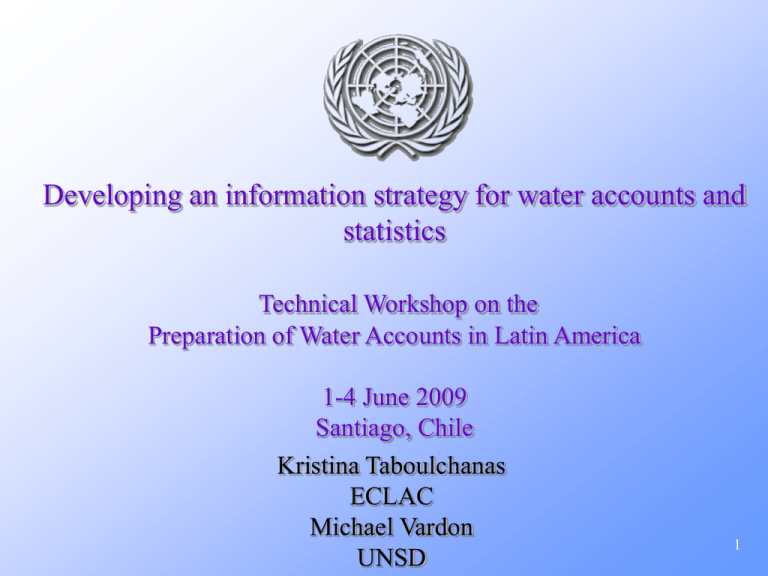
Developing an information strategy for water accounts and statistics Technical Workshop on the Preparation of Water Accounts in Latin America 1-4 June 2009 Santiago, Chile Kristina Taboulchanas ECLAC Michael Vardon UNSD 1 Outline • Water data stakeholders (data users and data producers) • Key lessons from SEEAW implementation • Data Collection Strategy: Process of development 2 Water data stakeholders (data users or data producers) Government Ministries responsible for: Water Environment Agriculture Electricity (especially hydro-electricity) Central planning Health, housing, infrastructure, public works, etc National statistics offices Meteorological agency Hydrological agency Government operated water supply or sewerage Government research agencies (scientific, economic and social) 3 Water data stakeholders (data users or data producers) Non-government Environmental NGOs Water supply companies Sewerage or wastewater treatment companies Agricultural associations (including Irrigation associations) Research institutions (e.g. universities) International agencies (e.g. UN, OECD, FAO) 4 Key findings of the Global Assessment and lessons from countries implementing SEEAW 1. Build on existing knowledge and recognise that a range of different systems are already in place 2. Cooperation is essential 3. High level support is needed 4. An agency needs to take the lead 5. A phased approach is needed and pilot or experimental accounts are very useful 6. A lot of progress can be made quickly 5 Build on existing knowledge and recognise that a range of different information systems are already in place • Many institutions already have information • Countries have developed information systems to meet their own data needs for management, including international obligations • These institutions need to understand that their data is valuable and that others could use it for their purposes 6 Cooperation is essential • The majority of countries report cooperation with other agencies in the production of water accounts (68%)* • Despite this the lack of cooperation or data sharing was identified as an issue in 32% of countries for water accounts* • Data are usually dispersed in many agencies (e.g. agricultural agencies collect information on irrigation water, water ministries collect information to construct water balances, etc.)* • In many countries there are data gaps and in some countries there is duplication of statistical activity* Cooperation in needed • Within statistical offices • Between statistical offices, water departments, economic/planning departments and agricultural departments • With the water supply industry • With the scientific and research communities *Data from the Global Assessment of • Between users and producers of information Water Statistics and Water Accounts 7 http://unstats.un.org/unsd/statcom/doc09/B G-WaterAccounts.pdf High level support is needed • The water accounts require a high degree of coordination within and between agencies, and so high level support helps to ensure that: • The proper legal and administrative processes are developed and used for the sharing and integration of data and that the duplication of activity is reduced between different agencies • Within agencies it paves the way for internal cooperation • There are no “turf wars” between or within agencies • Resources need to be devoted to the production of the accounts. 8 An agency needs to take the lead It is usual for one agency to take the lead in the coordination and production of the accounts. • In the majority (53%) of case the agency is most often the NSO* • The lead agency does the preliminary work, including learning the details of the SEEAW and investigating the available data *Data from the Global Assessment of Water Statistics and Water Accounts 9 http://unstats.un.org/unsd/statcom/doc09/B G-WaterAccounts.pdf A phased approach is needed and pilot or experimental accounts are very useful • Start with the accounts that address the issues of most importance to countries: • In water scarce countries it has been water supply and use and asset accounts. In industrialized countries it has been pollution and emission accounts. • Pilot accounts enable indicators and other policy uses to be demonstrated with data 10 A lot of progress can be made quickly • Many countries already have much of the data needed to compile water accounts • For example, China, Mexico, Jordan and Dominican Republic were all able to produce preliminary accounts within 6 months • In addition it appears that UNSD/UNEP, OECD/Eurostat and the EEA already collect much of the data needed to produce some of the water accounts • As such for many countries and agencies is a matter of rearranging current data to match the format of the standard tables and to ensure they are consistent with the definitions and classifications of SEEAW • In this process data gaps and deficiencies may be identified and, if important enough, these can be addressed 11 Data Collection Strategy: Process of development 1. Determination of data needs Identify the users and producers of water statistics (the stakeholders) 5. Production of data collection strategy, covering: The water statistics to be produced The legal and institutional arrangements for producing water statistics The roles and responsibilities for the different agencies in the production of water statistics 4. Agreement on roles, responsibilities and resources for producing water statistics 2. Review of: Existing water statistics Legal and institutional arrangements (i.e. the current roles, responsibilities and resources for collection, compilation and dissemination of water statistics) The resources available for producing water statistics 3. Identification and prioritisation of: Gaps in water statistics Data quality issues Legal or institutional opportunities and barriers to producing water statistics 12 Contact details Michael Vardon UN Statistics Division New York Phone: +1 917 367 5391 Fax: +1 917 363 1374 Email: vardon@un.org Kristina Taboulchanas Statistics and Economic Projections Division, ECLAC Santiago, Chile Phone: 56-2-210-2335 Fax: 56-2-210-2472 Email: kristina.taboulchanas@cepal.org 13
